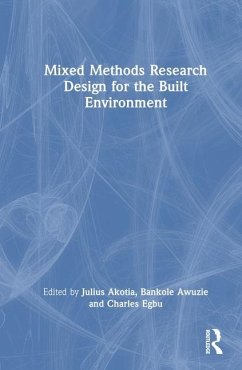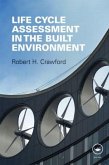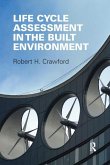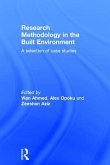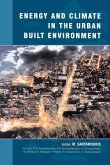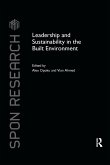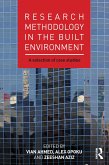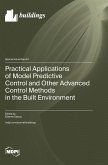Mixed Methods Research Design for the Built Environment
Herausgeber: Akotia, Julius; Egbu, Charles; Awuzie, Bankole Osita
Mixed Methods Research Design for the Built Environment
Herausgeber: Akotia, Julius; Egbu, Charles; Awuzie, Bankole Osita
- Gebundenes Buch
- Merkliste
- Auf die Merkliste
- Bewerten Bewerten
- Teilen
- Produkt teilen
- Produkterinnerung
- Produkterinnerung
Mixed Method Research Designs for the Built Environment provides a practical step-by-step guide to combining different research methods to complete vigorous built environment research projects.
Andere Kunden interessierten sich auch für
![Life Cycle Assessment in the Built Environment Life Cycle Assessment in the Built Environment]() Robert CrawfordLife Cycle Assessment in the Built Environment199,99 €
Robert CrawfordLife Cycle Assessment in the Built Environment199,99 €![Life Cycle Assessment in the Built Environment Life Cycle Assessment in the Built Environment]() Robert CrawfordLife Cycle Assessment in the Built Environment65,99 €
Robert CrawfordLife Cycle Assessment in the Built Environment65,99 €![Research Methodology in the Built Environment Research Methodology in the Built Environment]() Research Methodology in the Built Environment230,99 €
Research Methodology in the Built Environment230,99 €![Energy and Climate in the Urban Built Environment Energy and Climate in the Urban Built Environment]() Energy and Climate in the Urban Built Environment66,99 €
Energy and Climate in the Urban Built Environment66,99 €![Leadership and Sustainability in the Built Environment Leadership and Sustainability in the Built Environment]() Leadership and Sustainability in the Built Environment65,99 €
Leadership and Sustainability in the Built Environment65,99 €![Research Methodology in the Built Environment Research Methodology in the Built Environment]() Research Methodology in the Built Environment67,99 €
Research Methodology in the Built Environment67,99 €![Practical Applications of Model Predictive Control and Other Advanced Control Methods in the Built Environment Practical Applications of Model Predictive Control and Other Advanced Control Methods in the Built Environment]() Practical Applications of Model Predictive Control and Other Advanced Control Methods in the Built Environment95,99 €
Practical Applications of Model Predictive Control and Other Advanced Control Methods in the Built Environment95,99 €-
-
-
Mixed Method Research Designs for the Built Environment provides a practical step-by-step guide to combining different research methods to complete vigorous built environment research projects.
Produktdetails
- Produktdetails
- Verlag: Routledge
- Seitenzahl: 290
- Erscheinungstermin: 8. Dezember 2023
- Englisch
- Abmessung: 240mm x 161mm x 20mm
- Gewicht: 602g
- ISBN-13: 9781032068268
- ISBN-10: 1032068264
- Artikelnr.: 68475969
- Herstellerkennzeichnung
- Libri GmbH
- Europaallee 1
- 36244 Bad Hersfeld
- gpsr@libri.de
- Verlag: Routledge
- Seitenzahl: 290
- Erscheinungstermin: 8. Dezember 2023
- Englisch
- Abmessung: 240mm x 161mm x 20mm
- Gewicht: 602g
- ISBN-13: 9781032068268
- ISBN-10: 1032068264
- Artikelnr.: 68475969
- Herstellerkennzeichnung
- Libri GmbH
- Europaallee 1
- 36244 Bad Hersfeld
- gpsr@libri.de
Julius Akotia is a senior lecturer in Construction Project Management in the School of Architecture, Computing and Engineering (ACE), University of East London (UEL). He has a strong interest in research and has participated in major research projects, such as the London Olympic project with the CIOB team of researchers. His research interests lie in the area of sustainability. Bankole Osita Awuzie is an associate professor in Construction Management at the School of Construction Economics and Management at the University of Witwatersrand, Johannesburg, South Africa. Dr Awuzie's research interests are situated along a multi-, inter-, and transdisciplinary (MIT) plane with focus on the facilitation of sustainable, smart, and circular built environments in developing country contexts. Charles Egbu is a professor and the vice chancellor, Leeds Trinity University, England, United Kingdom. His research interests are in construction project management, mental health issues in construction, sustainable development, innovations and knowledge management in complex environments, and research methodology and methods.
1. Introduction to Mixed Methods Research Designs in the Built Environment.
2. Onto-Epistemological Assumptions Underpinning Mixed Methods Research
Designs. 3. Ethical Considerations in Mixed Methods Research Design. 4. A
Review of Mixed Methods Research Design in Construction Education. 5. A
Hybrid Project Management Model for Construction Projects: A Mixed Research
Approach. 6. Enhancing the Employability of Quantity Surveying Graduates: A
Mixed Methods Approach. 7. Understanding the Effects of the Built
Environment on Autistic Adults. 8. A Mixed Methods Evaluation of the Social
Value of Indigenous Procurement Policies in the Australian Construction
Industry. 9. A Methodological Application to Construction Economics
Research for Theory Refinement and Extension. 10. Effects of Physical
Infrastructure on Practical Performance of Graduates in Architectural
Technology in Southeast Nigeria: An Explanatory Sequential Mixed Method
Research Design. 11. An Exploration of Sustainable Procurement Practice in
Irish Construction-Contracting Firms. 12. Investigating the Accident Causal
Influence of Construction Project Features Using Sequential Exploratory
Mixed Methods Design. 13. Infrastructure Project Selection and
Prioritisation for Socio-economic Development in Mining Communities of
Ghana: A Sequential Mixed Methods Research Approach. 14. Exploratory
Sequential Mixed Method Research to Investigate Factors Affecting the
Reputation of PFI/PF2 Projects in the UK. 15. An Exploration of the
Implications of Sustainable Construction Practice: Mixed Methods Research
Approach. 16. Using Convergent Mixed Methods to Explore the Use of Recycled
Plastics as an Aggregate for Concrete Production in South Africa. 17.
Adaptive Mixed Methods Research for Evaluating Community Resilience and the
Built Environment.
2. Onto-Epistemological Assumptions Underpinning Mixed Methods Research
Designs. 3. Ethical Considerations in Mixed Methods Research Design. 4. A
Review of Mixed Methods Research Design in Construction Education. 5. A
Hybrid Project Management Model for Construction Projects: A Mixed Research
Approach. 6. Enhancing the Employability of Quantity Surveying Graduates: A
Mixed Methods Approach. 7. Understanding the Effects of the Built
Environment on Autistic Adults. 8. A Mixed Methods Evaluation of the Social
Value of Indigenous Procurement Policies in the Australian Construction
Industry. 9. A Methodological Application to Construction Economics
Research for Theory Refinement and Extension. 10. Effects of Physical
Infrastructure on Practical Performance of Graduates in Architectural
Technology in Southeast Nigeria: An Explanatory Sequential Mixed Method
Research Design. 11. An Exploration of Sustainable Procurement Practice in
Irish Construction-Contracting Firms. 12. Investigating the Accident Causal
Influence of Construction Project Features Using Sequential Exploratory
Mixed Methods Design. 13. Infrastructure Project Selection and
Prioritisation for Socio-economic Development in Mining Communities of
Ghana: A Sequential Mixed Methods Research Approach. 14. Exploratory
Sequential Mixed Method Research to Investigate Factors Affecting the
Reputation of PFI/PF2 Projects in the UK. 15. An Exploration of the
Implications of Sustainable Construction Practice: Mixed Methods Research
Approach. 16. Using Convergent Mixed Methods to Explore the Use of Recycled
Plastics as an Aggregate for Concrete Production in South Africa. 17.
Adaptive Mixed Methods Research for Evaluating Community Resilience and the
Built Environment.
1. Introduction to Mixed Methods Research Designs in the Built Environment.
2. Onto-Epistemological Assumptions Underpinning Mixed Methods Research
Designs. 3. Ethical Considerations in Mixed Methods Research Design. 4. A
Review of Mixed Methods Research Design in Construction Education. 5. A
Hybrid Project Management Model for Construction Projects: A Mixed Research
Approach. 6. Enhancing the Employability of Quantity Surveying Graduates: A
Mixed Methods Approach. 7. Understanding the Effects of the Built
Environment on Autistic Adults. 8. A Mixed Methods Evaluation of the Social
Value of Indigenous Procurement Policies in the Australian Construction
Industry. 9. A Methodological Application to Construction Economics
Research for Theory Refinement and Extension. 10. Effects of Physical
Infrastructure on Practical Performance of Graduates in Architectural
Technology in Southeast Nigeria: An Explanatory Sequential Mixed Method
Research Design. 11. An Exploration of Sustainable Procurement Practice in
Irish Construction-Contracting Firms. 12. Investigating the Accident Causal
Influence of Construction Project Features Using Sequential Exploratory
Mixed Methods Design. 13. Infrastructure Project Selection and
Prioritisation for Socio-economic Development in Mining Communities of
Ghana: A Sequential Mixed Methods Research Approach. 14. Exploratory
Sequential Mixed Method Research to Investigate Factors Affecting the
Reputation of PFI/PF2 Projects in the UK. 15. An Exploration of the
Implications of Sustainable Construction Practice: Mixed Methods Research
Approach. 16. Using Convergent Mixed Methods to Explore the Use of Recycled
Plastics as an Aggregate for Concrete Production in South Africa. 17.
Adaptive Mixed Methods Research for Evaluating Community Resilience and the
Built Environment.
2. Onto-Epistemological Assumptions Underpinning Mixed Methods Research
Designs. 3. Ethical Considerations in Mixed Methods Research Design. 4. A
Review of Mixed Methods Research Design in Construction Education. 5. A
Hybrid Project Management Model for Construction Projects: A Mixed Research
Approach. 6. Enhancing the Employability of Quantity Surveying Graduates: A
Mixed Methods Approach. 7. Understanding the Effects of the Built
Environment on Autistic Adults. 8. A Mixed Methods Evaluation of the Social
Value of Indigenous Procurement Policies in the Australian Construction
Industry. 9. A Methodological Application to Construction Economics
Research for Theory Refinement and Extension. 10. Effects of Physical
Infrastructure on Practical Performance of Graduates in Architectural
Technology in Southeast Nigeria: An Explanatory Sequential Mixed Method
Research Design. 11. An Exploration of Sustainable Procurement Practice in
Irish Construction-Contracting Firms. 12. Investigating the Accident Causal
Influence of Construction Project Features Using Sequential Exploratory
Mixed Methods Design. 13. Infrastructure Project Selection and
Prioritisation for Socio-economic Development in Mining Communities of
Ghana: A Sequential Mixed Methods Research Approach. 14. Exploratory
Sequential Mixed Method Research to Investigate Factors Affecting the
Reputation of PFI/PF2 Projects in the UK. 15. An Exploration of the
Implications of Sustainable Construction Practice: Mixed Methods Research
Approach. 16. Using Convergent Mixed Methods to Explore the Use of Recycled
Plastics as an Aggregate for Concrete Production in South Africa. 17.
Adaptive Mixed Methods Research for Evaluating Community Resilience and the
Built Environment.

